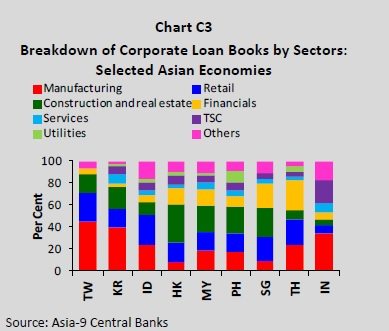Financial Vulnerabilities In Stability Part 2 – Sustained Growth in the Time of UMP
To continue from part 1, I assume everyone has read the lengthy treatise that the MAS team painstakingly puts up each year. http://www.mas.gov.sg/~/media/resource/publications/fsr/FSR%202014.pdf
It carries it usually cautionary tones that went unheeded last year or rather this year, as evidenced in the corporate bond issuance data (more junk) and they have become even more critical of the use of UMP (Unconventional Monetary Policies) as Japan and Europe ups the ante on their record breaking bond buying spree, suggesting growing vulnerabilities in all these policy uncertainties.
Their concerns are more valid than ever and I did a word cloud to compare 2014 with 2013.
2014 Word Cloud
2013 Word Cloud
This is, of course, inaccurate because of the additional studies on areas of interest but we note words like LIQUIDITY, CORPORATE, CREDIT, BOND, PROPERTY and RISKS have grown larger ! Plus the inclusion of new words like S-Reits that are mentioned more often.
Packing for value for money, MAS has worked overtime to include 2 extra studies for us, 13 compared to 11 last year, on matters of interest in the markets.
Some thoughts :
- Singapore Will NOT BE pursuing aggressive growth and there will be NO QE although I am not sure if they may ease in 2H15 should things go wrong
- Singapore is not keen on capital flows that will lead to reliance on offshore capital

- It is obvious they are saving their bullets for a rainy day
- Singapore has and will continue to stick to fiscal prudence and no one will be criticising them for it unlike poor Germany, being cajoled short of verbal abuse, for not taking on more debt and overspending
- We can expect some highly leveraged corporates to fail next year without causing a major market disruption

- They are worried about the UMFs and think it does not work … causing financial distortionsand vulnerabilities on the lack of structural reforms in those countries who latch onto the monetary policy bandwagon, using it as a reason to delay much needed changes to their systems
- In short, UMF is a WMD ? (weapon of mass destruction)
Things that matter to us :
MAS is highly critical of the global corporate bond markets, even offering suggestions on the improvement of liquidity by standardising bond issuances, improving risk disclosures and improving transparency.
Bond funds and ETFs are the risks to us in Asia on thin liquidity and herding behaviour
Property is expected to continue to cool with the risk of a sharp correction which could trigger a domino effect in the already elevated private sector debt market where much is borrowed using property as collateral (no mention of Sentosa because Ho Bee just won the top National Day Distinguished Service Order award last week)
Big time warning on the risks from purchase of overseas property which has risen from $1.9 bio in 2012 to $ 3 bio in 2013.
Tightening credit conditions onshore to protect citizens has led to growing cross border loans which brings me to my favourite chart in the entire stack.
Note that this represents the loans made from banks in Singapore which includes foreign banks as well.
And the chart on the distribution of those loans into industry types.
Singapore loves real estate and therein lies the proliferation of S-Reits. 30 listed Reits in 2013 compared to 16 in 2007, accounting for 8.3% of total market cap.
These 2 charts put forth the perspective and it looks odd to me.
Industrial space has risen nearly 1 fold on the index but industrial rents have not caught up. And office space has not performed in price terms but its rental has gone up much more.
To save themselves, Reits should henceforth throw in foreign assets that are difficult to value and I am not talking about Fraser buying those hotels.
Conclusion
The path to sustained growth is a long and arduous one for governments that are in for the long haul and with reputations to protect (eg. Obama is out in 2016).
And it is nice to be read sensible analyses from a central bank that is not encouraging every single investor to go out there and borrow themselves to death.
Thus for lucky Singaporeans, it will be harder to get rich but also harder to get poor.
Have a nice weekend.







Thanks for the really helpful recap and take on the report!
“Highly leveraged corporates” referred to the ones with bonds issued internationally, or in Singapore?
I think it should mean total debt – loans and bonds.
Of course, the cheapest place to issue would be Singapore and if a company manages to tap international markets, they should have passed through higher standards of QC.